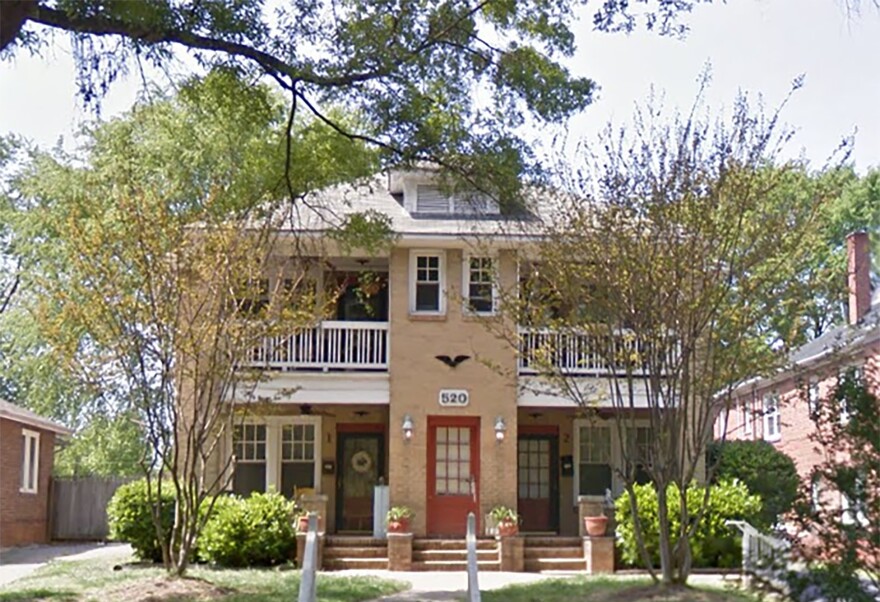OK, so remember the Unified Development Ordinance? That’s the new set of development rules for Charlotte that went into effect last summer. One of the more contentious changes allows duplexes and triplexes to now be built in neighborhoods previously only zoned for single-family homes. And some parts of Charlotte are now seeing that happen. We turn now to Tony Mecia of the Charlotte Ledger Business Newsletter for our segment BizWorthy.
Marshall Terry: Where's this happening, Tony?
Tony Mecia: Marshall, I started hearing about this a couple of weeks ago, checked into it, looked at public records, talked to neighbors, and it turns out that most of this building of new triplexes is taking place in south Charlotte, which has some of the highest housing prices in the city. There's a company called Aspen City Homes that has identified at least eight sites in South Charlotte and has put in filings with the city to develop triplexes on those eight sites in SouthPark, Lansdowne, Sedgefield, few other places in South Charlotte. Aspen City Homes did not return emails or phone calls from me this week.
It's probably worth noting that one of the contacts listed in city records for Aspen City Homes is Afshin Ghazi. A lot of people know him as the developer of the Epicentre. So these triplexes, as you mentioned, are really some of the first to be developed in Charlotte under the Unified Development Ordinance, which allows them to be put in single-family neighborhoods.
Terry: OK. Tony, remind me, what's the big deal over this? And why did City Council make this in the first place?
Mecia: Well, Marshall, the big deal is that sometimes neighbors don't like the idea of triplexes being built in their neighborhoods. They are raising concerns about parking, stormwater runoff, saving trees, and sometimes they say that triplexes are out of character in their neighborhoods. Now, it's worth noting that this is something that the city did intentionally to try to combat rising housing prices and to give people more choices and the types of housing that exist, and that's still the case now that these rules are coming into effect.
Alyson Craig, the city's planning director, told the City Council this week that she thinks that Charlotte has been 'under building' this type of housing, that there are a lot of apartment complexes, and there are a lot of single-family homes. But this kind of housing, duplexes and triplexes are so-called missing ‘middle housing’ that Charlotte has been chronically 'under building' those, and so it needs to sort of reverse that trend.
Terry: And can other parts of the city expect the same thing?
Mecia: I think, Marshall, eventually yes, we can expect to see this throughout the city. I talked to a builder this week and he said that the finances really make sense in south Charlotte because what you can buy the land for relative to what you can sell the triplexes for, that might not be the case in other parts of the city. But the thinking is eventually this is something that's going to take place all over.
Terry: All right. Well, let's move over to NoDa now, where a building used by musicians for rehearsal is being torn down. Now, I'm hearing this is a real blow for the local music scene.
Mecia: Yes. Queen City Nerve reported this week that NoDa Studios is closing at the end of March, that it is being sold, and that the site is being converted into 400 apartments. This is a space that bands and musicians use to practice or record. A lot of them told Queen City Nerve that they see it as a real low. One of them said, ‘I don't think we can even fathom how much of a hole this is going to leave.’ So, it sounds like a lot of bands and musicians are going to be looking for a new affordable place to play their music.
Terry: Finally, I want to end this week on a headline in the Ledger that caught my eye: ‘UNC Charlotte finds creative uses for 5,000 used tennis balls.’ So where did they go?
Mecia: Marshall, during COVID, UNC Charlotte discovered that its tennis team had a whole bunch of used tennis balls and so they needed to figure out what to do with them. And they've had some success. They've donated them to local schools, and the tennis balls go on the bottom of chairs to keep the noise level down in the classroom. They've donated them to Samaritan's Purse. Not quite sure what Samaritan's Purse is doing with them. And they've donated them to the Humane Society of Charlotte in order to keep dogs playing and active.
Terry: All right, Tony. Well, I'm a big fan of that last one in particular. Thank you.
Support for WFAE's BizWorthy comes from Sharon View Federal Credit Union, The Original Mattress Factory and our listeners.



